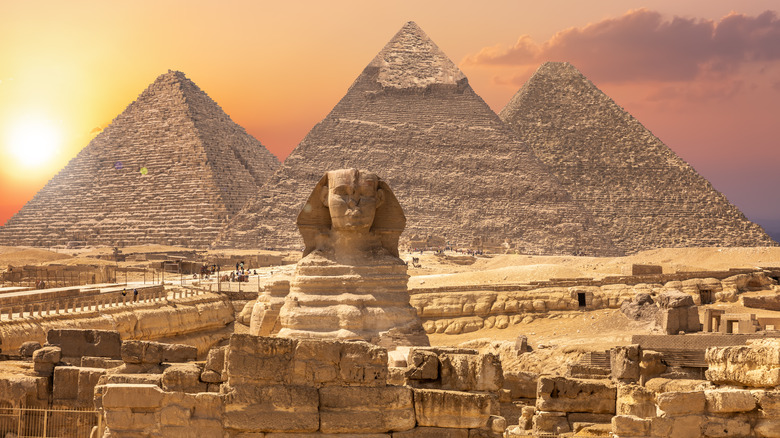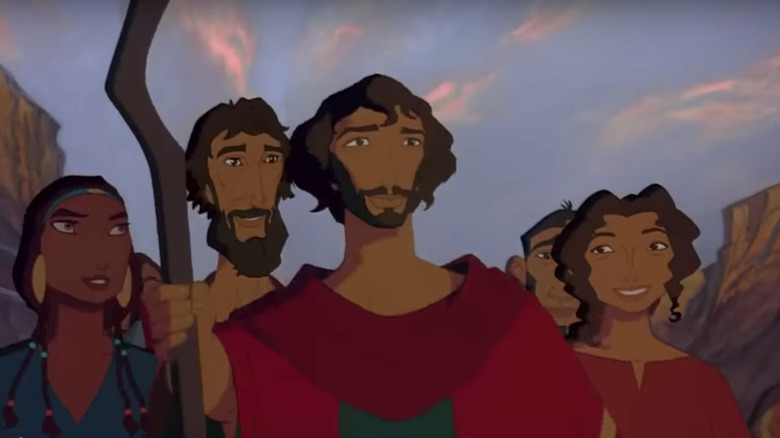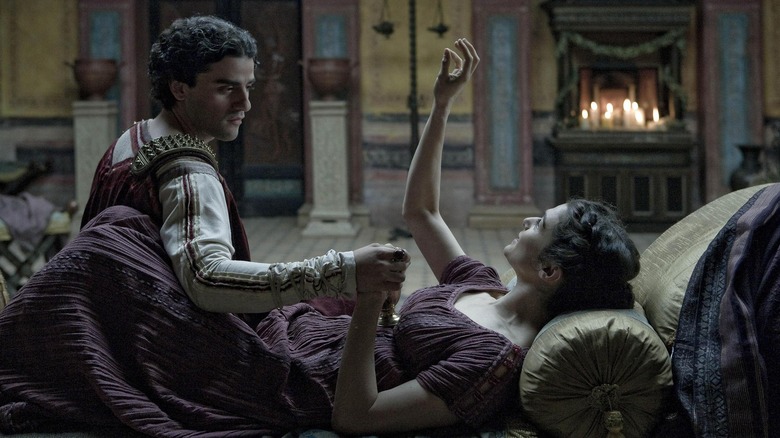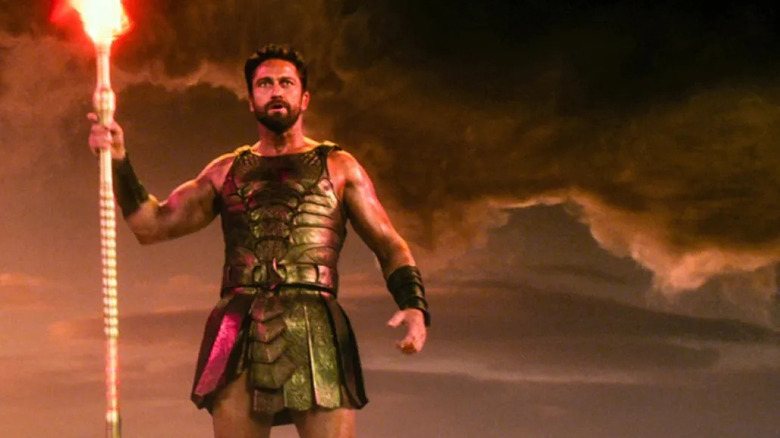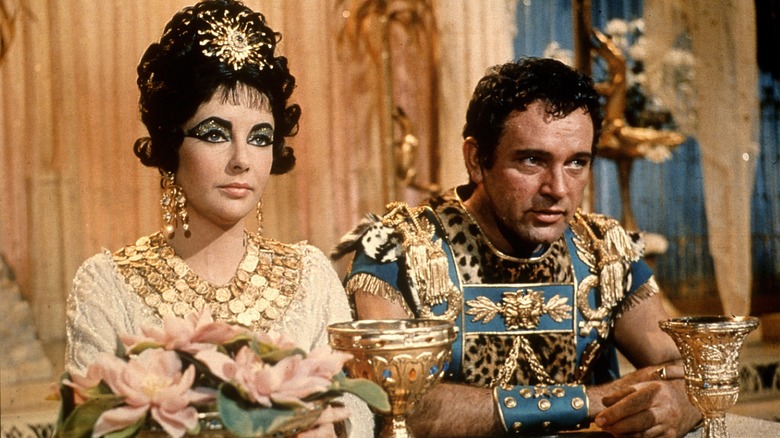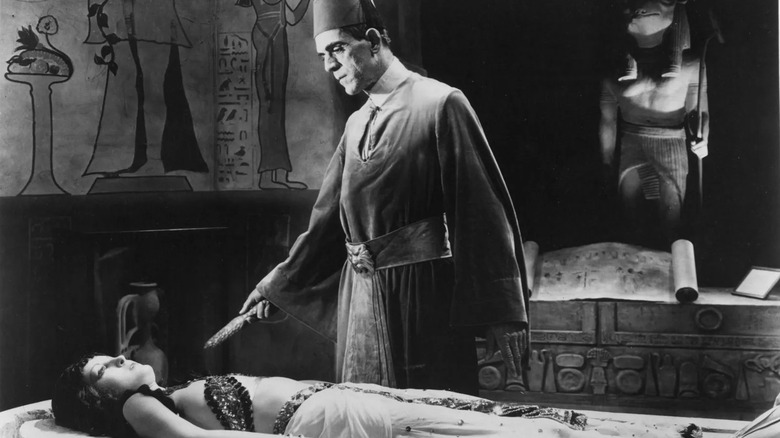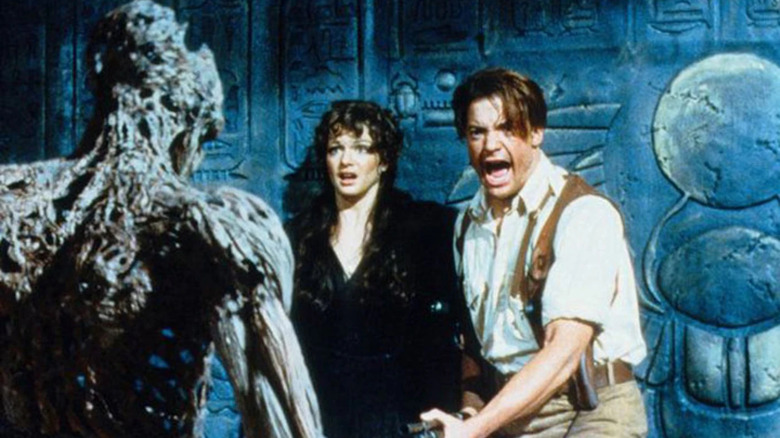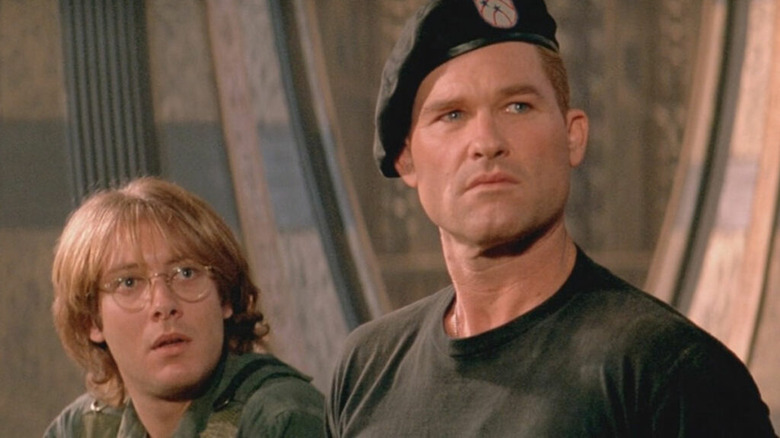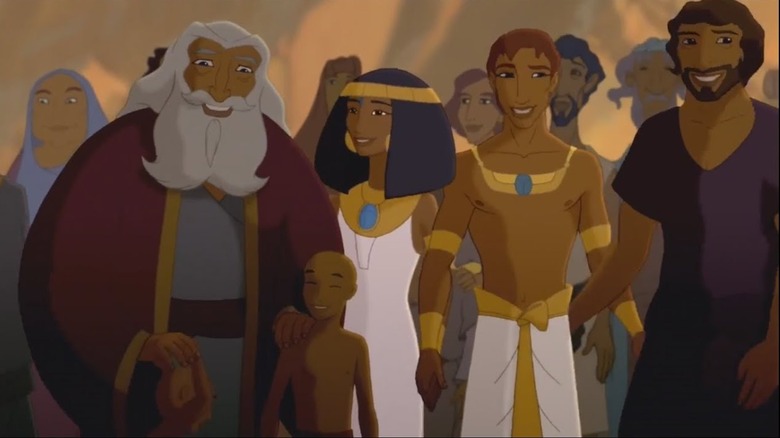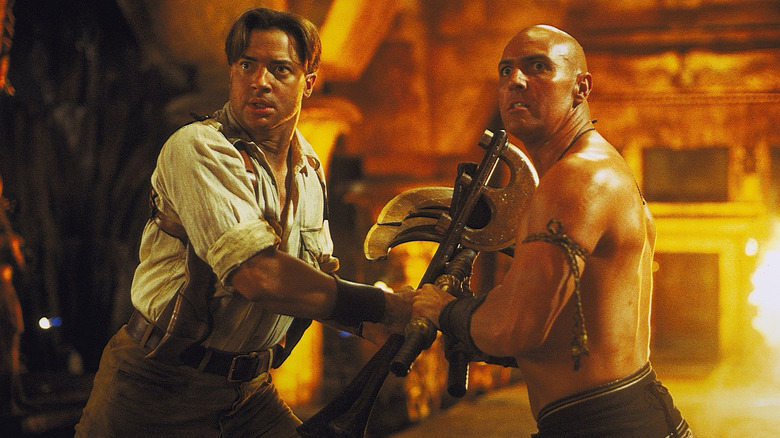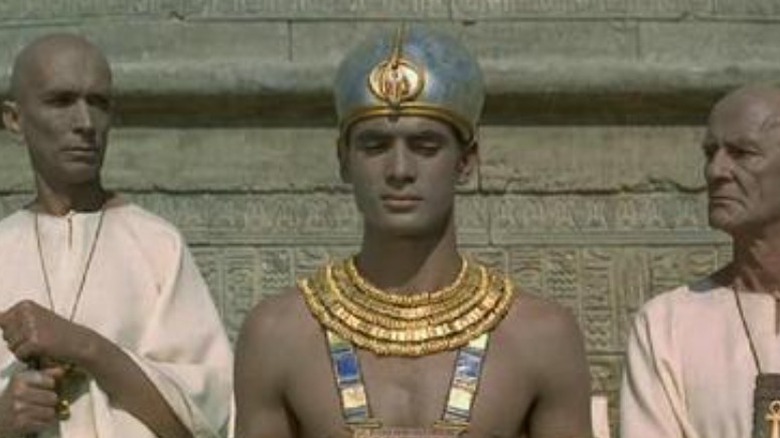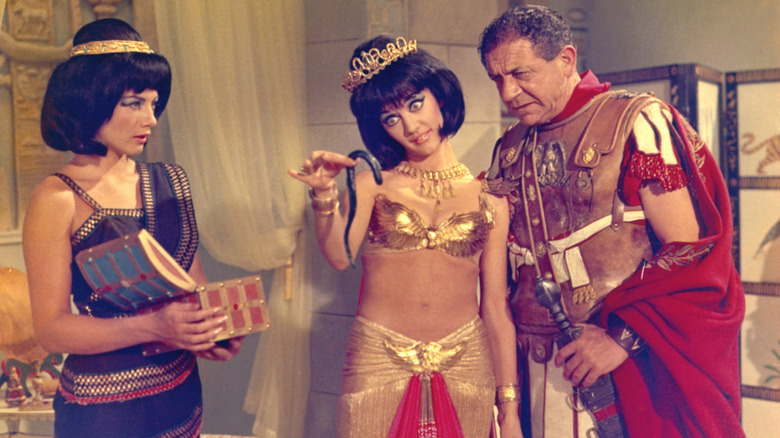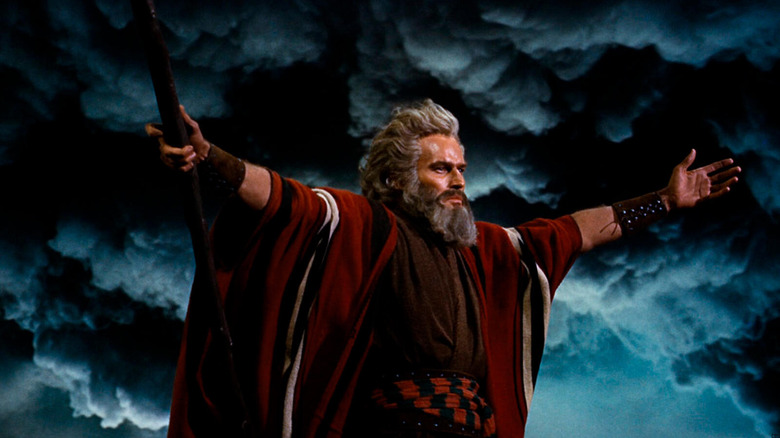Hands-Down The Best Movies Set In Ancient Egypt
We may receive a commission on purchases made from links.
Ancient Egypt continues to linger in the modern mind for a bunch of reasons. According to World History Encyclopedia, it's because of the grandeur and the nod to what humans can achieve, and the attention Egypt paid to it — monuments, mythology, tombs, and artwork that dates back to the pharaohs are nothing if not unique and awe-inspiring.
Still, there seems to be a pretty hefty lack of good movies set in Ancient Egypt. Vox thinks that's partially because Hollywood continues to cast white people as Egyptians, and that's certainly a contributing factor in the authenticity department. The other difficulty is that calling a movie empirically good or bad is pretty much impossible. You can just as much enjoy a really awful movie as you can a movie that sweeps every award and is heralded for its emotional core. There are countless parameters that make a movie good, and therefore watchable, and those parameters don't always have to be IMDB or Rotten Tomatoes rankings.
Chief critic of the Washington Post Ann Hornaday (via WPR) broke down the main factors of a good movie, and they are pretty self-explanatory: the script, the storyline, the actors embodying their roles, and cinematography. According to MasterClass, there's no clear-cut answer. And according to the Cornell Daily Sun, making an interesting movie may tie deeper into the human brain.
Issues aside, there are some solid movies set in the Land of the Pharaohs. However you define good, here are some highlights set in ancient Egypt.
Prince of Egypt (1998)
There is no shortage of movies about Moses. The biblical prophet of Ten Commandments fame just begs to be cast into a compelling narrative, whether it's based on fact, fiction, or a little bit of both. "Prince of Egypt" just puts it all together so well.
According to Collider, "Prince of Egypt" was the very first movie commissioned by DreamWorks, and there is nothing else quite like it despite the extensive resume that DreamWorks currently boasts. Everything in the movie is animated by hand, and the character and scene designs are just plain superior to other animated movies, both of the time and to this day. Roger Ebert referred to it as "one of the best-looking animated films ever made," and went on to add, "we sense the touch of human artists in the vision behind the Egyptian monuments, the lonely desert vistas, the thrill of the chariot race, the personalities of the characters."
The darkness of the film is also truly unique to the genre. While DreamWorks has leaned into comedies like "Shrek" and "How To Train Your Dragon," "Prince of Egypt" never deviates from the dark tone that makes it so haunting. There's an actual scene where the angel of death goes around and kills all the firstborns. As Ebert points out, "This is a film that shows animation growing up and embracing more complex themes, instead of chaining itself in the category of children's entertainment."
Agora (2009)
The other Egyptian movie with Rachel Weisz, "Agora" also stars Oscar Isaacs and Max Minghella and sets the scene so well of a Roman-occupied Egypt. And as World History Encyclopedia can attest to, this is a surprisingly accurate movie. While there are minor inaccuracies like the age of Hypatia, the foundation of the film is built on the presence of Christians, and that's where the history is spot on.
That said, not everyone wants to learn about history when they see a movie, and for those that just want to be entertained, the New York Times says you are in good hands as well. The official review of the movie highlights how focused on liberal ideals this movie is, ideals that will appeal to the modern audience. Not just that, but it reflects the modern-day too. It's chock full of warning bells that, while grating at times, still need to be heard.
"Agora" tells the story of a slave (Minghella) who finds the Christian message as his hope to achieve freedom from bondage. All the while, Hypatia (Weisz) teaches science and reason to a class that includes said slave, and a love triangle develops, establishing a thread of romance. And in the background, the battle between Christians and pagans bubbles on the streets of Alexandria.
Gods of Egypt (2016)
By all accounts, "Gods of Egypt" is not a good movie. You can reference any review, any ranking website, anything, and you will find a general murmur of dissent around the making of this movie, the message of this movie, and pretty much everything else about this movie. But that doesn't inherently make a movie unwatchable, and as many have pointed out, this movie is actually entertaining, thanks in part to its flaws.
If you go in knowing exactly what to expect, this is a movie that can satisfy. Even though the New York Times berates the whole movie, it leaves a familiar sentiment: "If 'Gods of Egypt' were any worse, it might be a masterpiece," adding that watching the movie is "a demented entertainment" before admitting that it was indeed enjoyable — perhaps from a so good it's bad standpoint, but still good by that standard.
The Guardian smashes the movie's qualities to bits but still resolves to call it "tremendously fun." They go on to highlight what makes "Gods of Egypt" so unique, and that's its "sheer number of fantastic and antic set pieces" spanning from the depths of the underworld to the tops of pyramids.
So yes, this is not an acclaimed movie, but both the New York Times and Roger Ebert hail various parts of its entertainment value — the action sequences, the backstory, and the visuals.
Cleopatra (1963)
If you've got four hours to kill and have already seen too much of "Lawrence of Arabia," the 1963 epic "Cleopatra" is a good place to invest the time. For all of the movies out there about Egypt, there is an adjacent list of all the movies depicting the whimsical Cleopatra as the centerpiece. So, with plenty to choose from, the question is why go with "Cleopatra" when there are many, many more options?
What this one has that the others don't is a firm dedication to the compelling character Cleopatra is. As Britannica points out, she was so powerful as a leader that she influenced Roman politics at the height of their empire. That is no small feat. In terms of powerful women in history, you need look no further. And while "Cleopatra" struggles in other accuracy departments, via Egyptian Streets, the character of Cleopatra is spot on with her arc of rising to the throne and then her involvement with Marc Antony and the Romans.
The Hollywood Reporter hits it perfectly with their assessment of the film's quality: "Power and passion are the twin and intertwined themes of 'Cleopatra,' and they have never burned with greater intensity or amid such opulence as they do in this extraordinary film."
And hey, if the 1963 film doesn't sound like your cup of tea, there's a remake starring Gal Gadot as Cleopatra coming soon too (via Vanity Fair).
The Mummy (1932)
The original "The Mummy" boasts a legacy that stretches back nearly a century. Not only did it give us the remake goodness of Brendan Fraser, but it established the actual monster "the mummy" on the same scale as the budding monster genre superstars it was sharing the big screen with. Way back in 1932, monster movies were still budding, and while "The Wolfman," "Frankenstein," and "Dracula" have their claim to fame, "The Mummy" is right alongside them.
After Universal Pictures had given the world "Dracula" and "Frankenstein" one year earlier, "The Mummy" took viewers to ancient Egypt like never before. What sets the classic "The Mummy" up isn't even necessarily its horror accolades, according to Audiences Everywhere, though it certainly has roots in that genre. It's the fact that it's more accurately a romance across time.
And just one more checkmark on the "why it's so good" list, unlike "Dracula" and "Frankenstein," "The Mummy" is an original story, according to David Robson's "The Mummy," with a few roots in an Italian story, but otherwise a story untold.
It retains such popularity among modern viewers that for the 90th anniversary, NECA unleashed new "The Mummy" action figures for 2022.
The Mummy (1999)
There have been a lot of movies that have tried to remake the successes of the 1932 "The Mummy," as Collider points out, but the only one that has hit with any real resonance is the namesake itself — the 1999 remake, "The Mummy," directed by Stephen Sommers. While not a take-for-take remake of the 1932 monster classic, it's steeped in the same lore and hits on a lot of the same notes.
"The Mummy" is a cult classic if ever there was one. Thrillist refers to it (perhaps a little tongue-in-cheek) as the only perfect movie, adding, "'The Mummy' belongs to a more carefree era, where blockbusters were made for a fraction of today's price and not everything had to set up a franchise." Essentially, it was the in the right place at the right time with just the right goods. Doubling up on Thrillist, What Culture refers to "The Mummy" as the perfect action movie, highlighting that it is how a remake should be done since most remakes these days are rather lacking, as an editorial in Rotten Tomatoes notes.
And it would be irresponsible not to mention how fantastic both Brendan Fraser and Rachel Weisz are. Fraser was monumental in the role and even inspired such young actors as Daniel Radcliff (via Cinema Blend) with his performance.
So while this movie doesn't technically take place in ancient Egypt, it spends enough time there and wouldn't exist without the mythology and folklore of it.
Stargate (1994)
While generally (and unfavorably) referred to as a rare movie that was worse than its spinoff shows (via ScreenRant), that doesn't mean that the 1994 science fiction flick "Stargate" isn't worth the viewing experience. Datebook says that exact notion — it's worth it to go back into the world that began in this movie (based on a book).
The story, which follows James Spader as a professor and Kurt Russell as a retired Army colonel, takes the two from the modern era back to a parallel world that is essentially just an amalgamation of ancient Egypt, with Ra ruling as a despot.
The Hollywood Reporter nails the allure of the original movie in their 1994 review: "'Stargate' is a blast from the past in many ways, but it imaginatively employs the latest special effects technology to give audiences new thrills." They add that the movie is an "entertaining throwback to mainstream adventure epics with a good mixture of traditional sci-fi elements and character-driven comedy."
Hard to make it sound any better than that. But Datebook doubles up on the original success by speaking to its value to the modern viewer. They say that there is no better time to go back and watch a movie that has always felt like a throwback. This is a classic science fiction, and that's what makes it so timeless.
Joseph: King of Dreams (2000)
After the success of "Prince of Egypt," DreamWorks decided to follow up on the biblical narrative wave of momentum with the story of Joseph, famous from the modern adaptation "Joseph and the Amazing Technicolor Dreamcoat" — though the animated feature certainly played the story a bit closer to the Bible than its 1968 musical competitor.
DreamWorks released "Joseph: King of Dreams" as their first made-for-video offering, according to Variety. While it's hard to stack up to the "Prince of Egypt," not to mention the general lack of success in sequels, DreamWorks delivered with another marvel full of rich storytelling and expert voice-acting. Variety draws attention to another focal point of the successes of the film — the music. They refer to the "soaring anthems" of the film and how they expected the songs to fly right into the mainstream music scene.
The Los Angeles Times highlights its "beautiful, big-screen quality, flowing animation and striking computer-generated imagery," as well as quality of its graceful and heartfelt content. And, reading further, it does exactly what "Prince of Egypt" did in not trying to be funny. It embraced its own vibe and made the most of it.
The Mummy Returns (2001)
Sequels generally don't do as well in nearly every category, according to the Spectator, and the same holds true for the sequel to "The Mummy." But there is still a lot of residual carryover just in having the original cast: Brendan Fraser, Rachel Weisz, John Hannah, just to name three, reprise their roles. But for some, like Roger Ebert, one of the perks of the sequel is the addition of Freddie Boath, who plays the son of Fraser and Weisz. According to Ebert, "Alex, the kid, adds a lot to the movie by acting just like a kid. I particularly enjoyed it when he was kidnapped by a fearsome adversary."
The other notable addition is The Rock, who made his big screen debut right here in "The Mummy Returns." Although you won't see that much of him, and when you do, he may have his head CGI'd atop a giant scorpion. Yet Entertainment Weekly sings the praises of the star and points out how this appearance sparked the now prevalent acting career of the wrestling sensation. This performance would pave the way to an expanded role in "The Scorpion King" movies.
Pharoah (1967)
Adapted from a Polish novel, "Pharoah" tells the story of the fictional Rameses XIII and his quest to reform ancient Egypt, with his chief opponent, the priest Herhor, trying to stop him. It explores themes of friendship, of power struggle, love, secrecy and even a bit of mysticism and plays it all very tightly to the actual historicity of what ancient Egyptians actually lived like.
While not every movie-goer intends to learn about history in their viewing experience, at least not as their primary objective, it still must be noted when a movie truly excels in the authenticity department. And sure, most probably haven't heard of this particular film, but if ever there was a craving for a true representation of life in ancient Egypt, this is it. In fact, it made the rounds so successfully that it even made it up for a 1967 Oscar nomination in best foreign film.
Martin Scorsese himself, the movie-making maestro, included the film on his 21 Inspirational Masterpieces list, which hails "Pharoah" as "a historical fresco of universal meaning (adapted from the lauded novel by Bolesław Prus), revealing the mechanisms of power and the influence of religion on social life."
Carry On Cleo (1964)
Following the blockbuster release of the sprawling, four-hour epic "Cleopatra," the British "Carry On" series took its parody recipe and applied it to the hulking ancient Egyptian behemoth. While comedies are by nature a bit more hit-and-miss for critics, this one carries a lot of the successes that can be found elsewhere in the "Carry On" series. According to Variety, "The practiced cast of Old Regulars are also, mainly, up to form, with Sidney James as Mark Antony and Kenneth Connor as Hengist the Wheelmaker particularly prominent."
Of course, it would be silly to come to a parody for historical authenticity, but the Guardian brings the highlights as well, summarizing the movie as, "spot-on ancient Egyptian boob and toilet jokes," while still taking the time to slight the lack of authenticity. As long as Egyptian boob and toilet jokes are your thing, you're in the right place.
The story itself documents the famous Cleopatra — but remember, don't come to this movie for the story, come for the comedy. The movie starts with a title card, "Whilst the characters and events in this story are based on actual characters and events, certain liberties have been taken with Cleopatra," and this is the humor that is maintained throughout the film — love it or hate it.
The Ten Commandments (1956)
There are simply no bigger movies set in ancient Egypt than the renowned Charlton Heston playing Moses in "The Ten Commandments." At least if you're looking at it from a money grossing standpoint. It is the highest-grossing Christian-themed movie of all time, beating out "Ben-Hur." And if you adjust for inflation, it has grossed $2 billion, according to Yahoo! Entertainment, which would put it sixth all time (via IMDB), behind "Titanic" and above "Jaws." If that still isn't enough to make this good enough for at least one viewing, consider that The Hollywood Reporter's review of the film in 1956 had some pretty intense praise: "It is not just a great and powerful motion picture, although it is that; it is also a new human experience."
The film tells the tale of Moses and the narrative surrounding the creation of the Ten Commandments as the foundational tenets of the Christian faith. But this movie goes beyond just the Christian viewer as well. After all, consider another quote from The Hollywood Reporter's review: "Is it a great movie? Entertaining? Artistic? Well, yes. But this is a little like inquiring timorously if the Colossus of Rhodes was a nice piece of statuary, if the Parthenon was a pretty little church."
For all the grandeur that this movie brought in production value, the reviews brought the same grandeur in their heaping praise.
